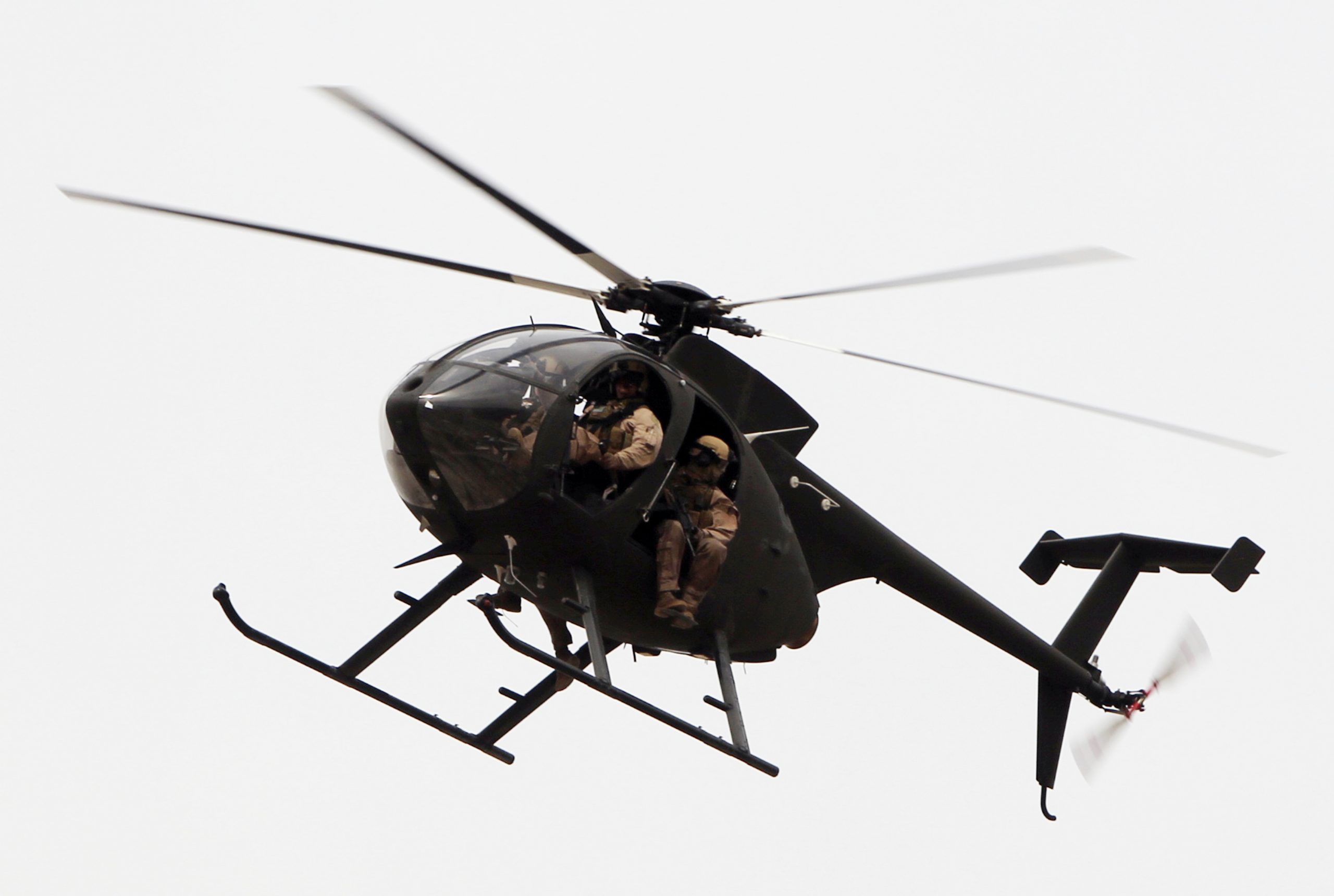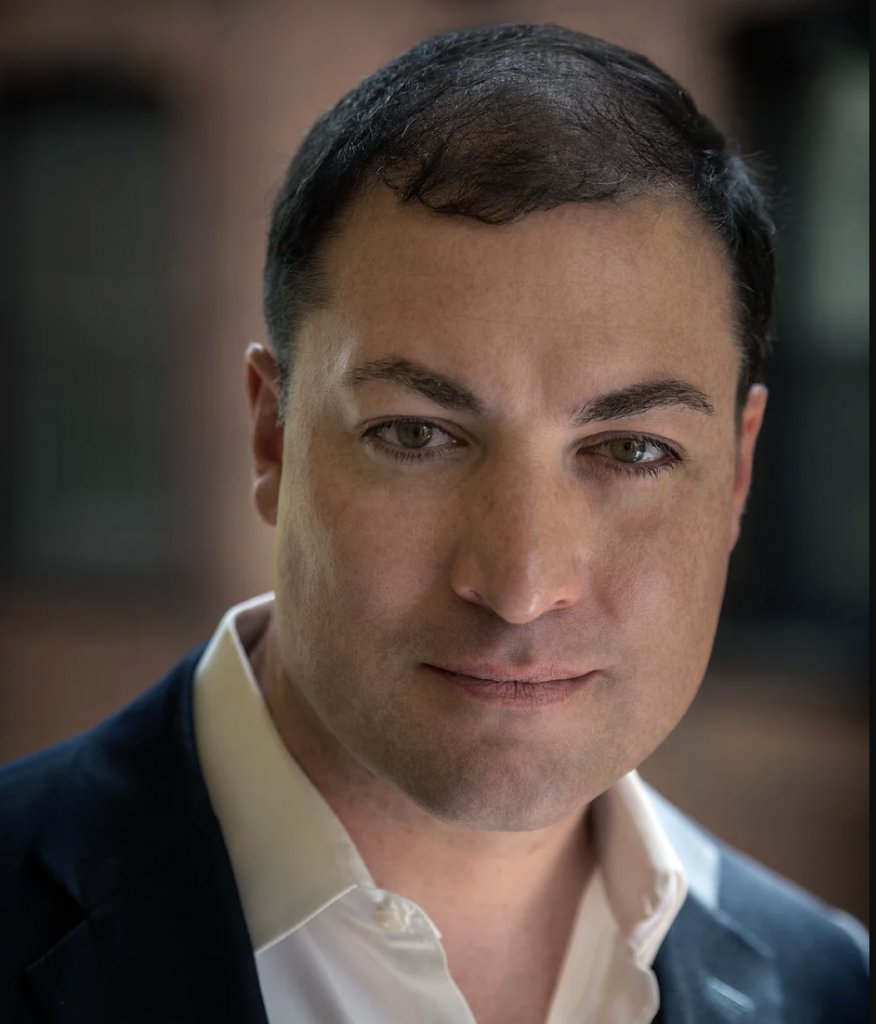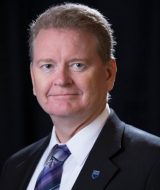
- 21 Sep 2020
Mercenaries or Private Military Contractors? Privatising the State Monopoly of Violence from the Middle East and Beyond
Abstract
In this webinar, Dr Sean McFate, Mr Jamie Williamson and Mr Doug Brooks will discuss how mercenaries and private military companies are changing the rules of war and peacebuilding. Since the second Iraq conflict, the growing presence of private military contractors has generated the need for effective public and private participation and re-statement of existing international law regarding the contractors’ oversight, enforcement and accountability, specifically in armed conflict environments.
This public talk will be conducted online via Zoom on 21 September 2020 (Monday), from 7.30pm to 9pm (SGT). All are welcome to participate. An e-invite will be sent to you closer to the event date.
This event is free, however, registration is compulsory.
Image caption: A Hugues-500 helicopter of the DynCorp International, one of the private security companies that protect US embassy staff and convoys in Iraq, flies above Baghdad on January 18, 2012. Photo: Ahmad Al-Rubaye / AFP
Listen to the full event here:
Watch the full event here:
Read the Summary of Event Proceedings:
By Herman Lim Bin Adam Lim
Research Assistant, Middle East Institute, National University of Singapore
The terms “mercenary”, “private military contractors” (PMC) and “private security companies” (PSC) are often used interchangeably, particularly when discussed in popular media, without capturing the nuances inherent within each term. In this discussion, Dr Alessandro Arduino, principal research fellow at the Middle East Institute of the National University of Singapore, invited three industry experts, Dr Sean McFate, senior fellow at the Atlantic Council in Washington, DC, Mr Jamie Williamson, head of the Secretariat of the International Code of Conduct Association (ICoCA), and Mr Doug Brooks, founder of the International Stability Operations Association (ISOA), to define these three terms clearly, especially since any ambiguity in their usage can create dangerous gray areas for exploitation within international law. Furthermore, the key question being asked in this webinar is whether the use of mercenaries has moved well beyond the Middle East — to being employed globally — and whether their increasing use is changing the rules of war and peacebuilding.
Mr Williamson spoke about how the label “mercenary” is being tagged onto anything that is deemed security and military-related, and quite often in armed conflict situations. In popular media, it can be used loosely to effectively cover everything that goes from the spectrum of security contractors in a very basic sense, such as unarmed security personnel standing guard outside an NGO facility in Kenya, all the way through to Wagner group type elements, and such statements create a disservice in understanding the landscape at hand.
He elaborated on the legal framework by referring to two treaties that give a definition of the term “mercenary” and their legal rights in a conflict zone: the UN Convention for 1989, with 36 state parties, and the OAU (Organisation of African Unity) Convention on the Elimination of Mercenarism, with a similar number of state parties. These two treaties were inspired by the 1977 Additional Protocol 1 to the Geneva Convention, which states, in legal terms, that mercenaries refer to individuals who are involved in armed conflict, who are not fighting for the armed forces of one or the other party, or not being integrated into the armed forces involved in the armed conflict. From a humanitarian perspective, they will not have the same immunities and privileges as legitimate combatants, and will therefore not be treated as prisoners of war.
In crafting these definitions, the OAU Convention and the UN Convention were very much focused on the legality and illegality of mercenaries, and sought to outline when certain types of actors have gone beyond what is lawful in their actions, in particular in armed conflicts, said Mr Williamson. They were crafted in the postcolonial era, when questions over the protection of human lives during the wars of national liberation were of paramount concern. These definitions nonetheless captured a very narrow set of actors. As we move forward, he said, we still do not have much more in terms of hard treaty laws that look at private military and security companies (PMSC). Since the creation of the Montreux Document in 2008, however, the term PMSC has been used to group military contractors and security companies together, even though they offer very different spectrum of services.
One end of the spectrum focuses on the type of security the International Code of Conduct Association (ICoCA) is interested in, while military-type contractors occupy the other end, offering defence industry kind of support, training and equipping personnel, providing logistics and intelligence, and manning forward operating bases (FOBs). For both, there still exist gray areas. The further one goes towards the military side, the more gray areas there are between security and military. Towards the end of the military spectrum, one gets closer to the so-called mercenary-type activities, said Mr Williamson.
The other set of instruments to look at, beyond the International Code of Conduct — which specifically addresses the conduct of security contractors in complex environments, not military companies — is two other processes in front of the UN. The UN working group on mercenaries is focused on mercenaries and, more recently, also looks at security companies and military contractors. At the same time, there is an open-ended intergovernmental working group which is developing a regulatory framework through the UN and the Human Rights Council right now to look at pragmatic implementation of dealing with security companies. In sum, the Montreux Document, the UN working group for mercenaries, the open-ended intergovernmental working group, and the International Code of Conduct have, over the past few years, tried to clarify these labels and are attempting to be more specific in terms of accounting for the oversight, accountability and transparency of such companies, and to determine what is the appropriate legal framework that applies to those services.
Answering the key question of whether mercenarism is being employed outside of the Middle East, Dr McFate said that PMCs in the last 10 years have morphed from a US and coalition-led operation in Iraq and Afghanistan, to a much more free market for force, where we see them being used in Ukraine, Iraq, Syria, Yemen, Nigeria, Mozambique, Venezuela and Libya. There is a globalisation of mercenaries in conflict zones around the world, with some countries like Russia using mercenaries as a new weapon of choice — like the Wagner group from Mozambique, through Africa, all the way to Libya. The attractiveness of such organisations in the world, he said, is because they give some plausible deniability. If one intends to wage war in secret, mercenaries are a good and cheap way to do it. The reason why that matters is because we now live in a global information age, where weapons that give you plausible deniability like mercenaries are more effective than old-fashioned fire power. The trend of the expansion of mercenaries is, therefore, moving well beyond the Middle East.
Inquiring about the international stability operations industry, Dr Arduino asked Mr Brooks what the difference between the international private security industry and the international stability operations industry is, and whether there is also an evolution for the stability operations industry from Iraq to Afghanistan.
Mr Brooks responded that the largest stability operations industry include any sort of private company that works in a complex environment or basically anywhere there is a conflict going on. The industry itself generally works for international organisations or governments, and it can be split up into logistics companies, security companies, companies that do security sector reform and development and essentially create a new state where it had collapsed before, and organisations that support the industry — law firms, insurance firms, consultants.
The biggest part of the stability operations industry is, in fact, the logistics and support companies, said Mr Brooks. One thing to keep in mind for all these companies is that a vast majority of their employees are actually local nationals, so when we get into the terminology aspect of what is a mercenary, we need to keep in mind that there’s a very large legitimate industry that largely uses locals to do most of the work, he added.
When one is looking at a peacekeeping or stability operation, the people who should be doing the work — who should be doing the security and the reconstruction — should probably be the locals. From the numbers and percentages, whatever growth that is seen in this industry is because of the fact that the international community recognises the value and expertise that the private sector of expertise brings. The size of the industry grows and shrinks depending on demand. It was much larger back during the days of Iraq; it is a smaller industry now, but it is still able to expand as required for the next stability peacekeeping operation that goes on in the world. The security companies are maybe 5 to 15 per cent of the industry, depending on the level of risk that’s going on in the peacekeeping operation.
Mr Brooks stressed the need to understand that a private security company is very different from a private military company. It ultimately boils down to why you hire: for a private security company, essentially one is hiring a company that is protective and defensive. It is protecting a person or place or thing that it has been hired to protect. The security companies can be armed or they can be unarmed — they operate legally under the host government and under the country where they originate from, and they have a very different role from how one would use a military in a peacekeeping operation. This industry , therefore, separate from what Dr McFate talked about, which is much more of an ungoverned aspect of security than the standards of private security companies.
With much interest in the Wagner Group, Dr Arduino revisited the point about accountability and legitimacy. From Syria, Libya, and even in Mozambique, there was a call for action for the Russian Wagner group. There are even other new actors, like the Chinese private security companies, that are mostly used to guard project infrastructure and personnel along the Belt and Road initiative. How, Dr Arduino asked, then might we classify these actors?
Mr Brooks replied that, when you talk about the likes of the Wagner group, and there are several Russian actors similar to that, most academics would actually classify them as state actors, even though they are technically private companies. The way they are used, essentially, is with the express or implied permission of the Russian government, and one would expect that, in terms of holding them accountable, you would have to actually work through the Russian government on that. He argued that there are some precedents for this, if you look at Bob Denard from the 1960s and 1970s, where he was essentially an arm of the French government, almost everything he did had to have the preordained blessing of the French government. The Wagner group, therefore, is something like that, with a huge difference: it is a private company that is trying to operate legally and professionally. It has a different role and a different level of protection.
Dr McFate drew attention to the fact that different parties called the Wagner group by different terms. Russia calls this group a PMC, but most observers think of them as a mercenary. The irony lies in the fact that the US called Blackwater, an American security company, a PMC, but many international observers thought of them more like mercenaries, and this part of the problem of labels. To Dr McFate, there is certainly a gray area, and the concept of legitimacy tied to states is less compelling to him than what these people are actually doing on the ground.
Highlights from the Question & Answer Segment
Dr Alessandro Arduino: Question 1 is for all speakers. Kidnapping is a present threat to multinationals investing in a complex environment. Do security companies have a legitimate role in providing negotiation and rescue services?
Mr Doug Brooks: There’s a sector of the industry called the K&R, kidnap and ransoming, and there are a number of old security companies that have been doing this sort of work. Essentially, you, as a business, will buy an insurance policy with one of these companies, and if any of your executives and personnel are kidnapped, this company will come in. Ninety-nine per cent of the time it’s a negotiating process. That is a legitimate part of the industry. There are rescue services also, though it’s rarely done — usually it’s a negotiating process.
Mr Jamie Williamson: When there is a rescue service, there’s where you have all sorts of initial questions in terms of what action is contemplated, what kind of rescue mission is put in place, the jurisdiction in which the operation takes effect, and the precautions that go with it. How much force is that entity allowed to use, and are the so-called rescue missions carried out in combination with local law enforcement or with, let’s say, local militaries that may be in that particular jurisdiction. I think that is where it becomes more tricky in terms of the protection of the individuals and the responsibility if something goes wrong, but also in terms of the SOP and the rules of the use of force and engagement.
Dr Arduino: Tricky question to all three speakers. Is the private security sector more efficient and accountable than the public security sector?
Dr Sean McFate: Would you rather be taken as a prisoner of war by say Blackwater or Sudan? Looking at the work of private military (using the word very loosely), for example, the work of Executive Outcomes in the 1990s in Africa. For years, the civil war in Angola was grinding on. For years, the RUF (Revolutionary United Front) ruled parts of Sierra Leone and committed some of the worst human rights abuses in the world, and the international community could not or would not stop it. In comes Executive Outcomes and they stop it within weeks. The Nigerian military could not contend with Boko Haram for years, and in 2015, private military actors came into Nigeria and worked with the Nigerian military to push Boko Haram out of Nigeria, or substantial amounts of it in weeks. I think actions speak louder than words.
Mr Brooks: In terms of the cost effectiveness of these stability operations companies, the reason you use them is because they’re faster, better, or cheaper, some combination or all three. And there are other cases where they make a lot more sense. For example, at one point at the peak of the Afghan conflict the US was spending about 1 million dollars per soldier that they had deployed in Afghanistan. Local private security costs you maybe $400–500 a month. For some roles, it just makes more sense to go private.
In the rebuilding of Iraq, for example, they had rebuilt a sewage treatment plant as part of the reconstruction. Do you want regular military people protecting this from insurgents? [It would be an embarrassment if there was a casualty and you had to write to the parents about what their child was doing]. A private security company that hires locals and trains them up is a much better option. In terms of accountability, when you have private security, you can fire a company, like Blackwater, as has happened. You can’t fire the United States Marine Corps. It’s must easier to hold private individuals to law. Several Blackwater individuals are in prison for what happened in Iraq back in 2000. In terms of cost effectiveness and accountability, it just makes sense. There are times where public forces or regular militaries make a lot more sense, and have a lot more legitimacy, but in general it’s a more cost effective solution by going to private sources.
Mr Williamson: I want to make sure that we are not putting the entire discussion into one hat, speaking about the military-type security operations. If you provide me a choice between public law enforcement agencies, local police and the likes in complex environments, where we have weak governments, potential security vacuums, and a well-regulated, properly licensed security company, be they armed or unarmed, I think the gut feeling may be moved towards the security contractor because you do have a professional entity that can provide you security, not in a military sense, but in terms of the self-defense, protection of property, protection of individuals. And you see that recourse by many entities in complex environments, not just in conflict situations but also high risk environments. There are a number of countries out there which are unstable, and the range of clients, be they NGOs, humanitarians, UN agencies, in many of these environments they immediately gravitate towards private security contractors. They do not depend solely on local law enforcement agencies to provide security. And it may be because of choice or may simply be because of the lack of capacity, because in some of these environments you’ll find that the local law enforcement agencies themselves are either operating well below capacity or may have very limited training, and themselves may be providing you more risk than actual safeguards if you use them. So it’s a case-by-case basis. I would, again, separate the discussion with regard to security in terms of security companies, from the security in terms of top security operations that Doug was alluding to in his answer.
Dr Arduino: The private sector currently contributes significantly to wider industry regulation. Could large multinationals use their leverage in complex environments to promote positive change?
Mr Williamson: I think yes, certainly. We need to look at the supply chain and the management of security in that particular supply chain, and the incentives, be they commercial or reputational and the likes. The trends that we have looked at, if you consider the fact that the International Code of Conduct itself was adopted in 2010, the Montreux Document in 2008 very much builds its parameters and references and best practices around the experiences in Iraq and Afghanistan during the coalition conflicts there, and the experiences in particular of military type contractors, [and] less [to do with] security companies.
With the Code of Conduct being adopted, the initial focus in 2010 was similarly on those kinds of entities. Fast forwards 10 years, the landscape has evolved, and from an association perspective, we look at complex environments, and in these environments there are a range of actors that I have mentioned already, but there’s a large business component as well. So you have major commercial entities operating in many of these high risk/complex environments, which includes major multinationals, and the extractive industry, for instance, or breweries we’ve mentioned a few in our previous webinars and likes, and they of course will be using security. And both in their choice of security provider, but also in terms of the demand that they place on the security providers, who these days in many environments are I would say are majority local security providers, they can play a major role in ensuring that those security providers are operating in internationally recognised standards.
It’s not only to the benefit of the security provider to be operating to the standard, but it’s clearly a benefit to the major client because it works up the supply chain. If something goes wrong, there’s that due diligence element that has to sit in the supply chain of the major client. And then we’ve seen, for instance, in a couple of cases recently not linked to security but linked to other issues where investors may start to have a major role to play, in terms of holding to account the multinational, the board of directors, the chief executive officer for shortcomings anywhere down the supply chain. And I daresay over the next few years — well, I hope so anyway — we’re going to see more focus on security matters in the supply chain in these complex environments.
Mr Brooks: If I can add on, there’s a real aspect here that is driven by the clients. The industry is happy to be operating at a very high level, but if you have clients who are essentially going for the cheapest company they can find, they are going to lose a lot of the work that’s been done by the industry, by the international community, by the NGOs to essentially set standards and guides. ISOA [International Stability Operations Association], or IPOA [International Peace Operations Association] as it originally was, had a code of conduct that it was built around, that all those companies were willing to follow, and ICoCA [International Code of Conduct Association] is obviously a more elaborate aspect of this.
There’s an incredible capability for these companies to do this sort of global governance on their own, or I should say in conjunction with the international community. But you’re still getting a lot of clients, including governments, who are simply going for the lowest price they can get, and you lose a lot of these capabilities that have been developed.
Dr Arduino: Yes, the pricing issue is a big issue, from personal experience on the Chinese side. There is also the blame that they try to find the private security firm with the lowest budget, and then the problem of capabilities. Sean, anything to add?
Dr McFate: I totally agree with Jamie and Doug, I might even go further by saying the private sector, especially the extractive industry might drive industry behaviour through their market power, in ways that go beyond state norms and state control, and I don’t mean that in a negative way. I just mean that the private sector and multinationals will have more influence in this industry in the decade ahead.
Mr Brooks: There’s something called the Voluntary Principles on Security and Human Rights, which was developed through the extractive industry, and it addresses some of the points that Jamie brought up, that in effect a group of companies and fairly radical NGOs in the early days got together and said there’s a whole bunch of things we can agree on in terms of how to do security and they created some guidelines as well that i think are well worth looking at.
Dr Arduino: Would the same concerns that affect the private security sector in the Middle East affect private security contractors’ role in emerging domains like the South China Sea? If not, what would be some concerns in those areas? Sean, you can start.
Dr McFate: Well, the South China Sea is an interesting case because it’s maritime, and there are not that many maritime security contractors— there are some, and Jamie can tell you much more about that than me — but they’re not exactly based on the privateer model of old.
Maritime security has different technicalities and costs than land-based private military contractors. But answering your question, I think yes, the industry has really gone global. It’s not just a Middle Eastern or South Asian phenomenon, we’re seeing the industry remerge all over Africa, both north and sub-Saharan. We have examples, like in Venezuela’s Bay of Piglets and the American former Green Beret. But nobody should have the false security that mercenaries like that are sort of a ludicrous villain.
The US government puts bounties on heads of states like Maduro in Venezuela and my concern is that it attracts the flies, if you will, that that attracts mercenary activity — and I’m using mercenary in a very specific manner there. But yes, I do believe that as the industry expands, it will find new conflict markets and the rules of the road will change I think in surprising ways at times.
Dr Arduino: Based on their analysis, how would you situate the Nepalese Gurkha, who have traditionally been recruited by the UK? They’ve been criticised for their divided national loyalties. Would you classify them as mercenaries or as private military contractors?
Mr Williamson: I’ll answer part of that. As far as I can see, there’s nothing ”private military” about them — they’re integrated into the armed forces of another country, but they are certainly not security contractors, in the sense of the International Code of Conduct. To answer your question, you need to look at the level of integration, and the command and control. Have those individuals operated on behalf of another country? Have they been integrated into that chain of command? Do they serve under the flag? Do they wear their uniforms? All these criteria are laid out in the Geneva Convention; if they fulfil that criteria, that they are part of that armed force as such, and they must then fulfil the requirements of the Geneva Convention on international and humanitarian law. If, however, you find entities that fall outside of that criteria set, then you have, potentially, something which is more on the private side. But as far as I know, the Gurkhas are formally integrated and the recognition goes with it.
Mr Brooks: To add on, the former British Gurkha military workers who have retired out of the military are in high demand in the private security industry. They’re very good, professional, well-trained and speak English. But when you ask this question, it gets into the loosy-goosey term of mercenary. We may have a detailed definition of what a mercenary is, but the way it is used by the media and some of the press is basically a mercenary is a business person or a foreigner that we don’t like. That’s what it boils down to, and it becomes a derogatory term — and it’s used against British Gurkhas and that’s unfortunate.
About the Speakers

Senior Fellow,
Atlantic Council,
Washington, DC
Mr Jamie Williamson,
Executive Director,
International Code of Conduct Association (ICoCA)
Mr Doug Brooks,
Founder and President Emeritus,
International Stability Operations Association
Moderator:
Dr Alessandro Arduino
Principal Research Fellow,
Middle East Institute,
National University of Singapore
Dr Sean McFate is a foreign policy expert, author and novelist. He is a senior fellow at the Atlantic Council, a Washington, DC, think tank, and a Professor of Strategy at the National Defense University and Georgetown University’s School of Foreign Service. Additionally, he serves as an advisor to Oxford University’s Centre for Technology and Global Affairs.
Dr McFate began his career as a paratrooper and officer in the US Army’s 82nd Airborne Division. He served under Generals Stan McChrystal and David Petraeus, and graduated from elite training programmes, such as Jungle Warfare School in Panama. He was also a Jump Master.
Subsequently, he became a private military contractor where he dealt with warlords in the jungle, raised armies for US interests, rode with armed groups in the Sahara, conducted strategic reconnaissance for the extractive industry, transacted arms deals in Eastern Europe, and helped prevent an impending genocide in the Rwanda region circa 2004.
Dr McFate holds a BA from Brown University, an MPP from the Harvard Kennedy School of Government, and a PhD in international relations from the London School of Economics and Political Science (LSE). He lives in Washington, DC.

Mr Jamie Williamson heads the Secretariat of the International Code of Conduct Association (ICoCA). The association promotes, governs and oversees the implementation of the International Code of Conduct and promotes the responsible provision of private security services. As executive director, Mr Williamson brings to the ICoCA a wealth of international, legal, military and security experience. He joined the ICoCA in October 2017 after several years as the head of the relations with Arms Carriers Unit at the International Committee of the Red Cross (ICRC).

Mr Doug Brooks is the founder of ISOA, the International Stability Operations Association, an organisation for which he served as president for almost 12 years and now retains the title of President Emeritus. Mr Brooks is a specialist on private sector capabilities and African security issues and has written extensively on the regulation and constructive utilisation of the private sector for international peacekeeping and humanitarian missions. Mr Brooks has testified before the US Congress, South African Parliament and to UN functions, and as an advocate for the Stability Operations Industry. He makes frequent appearances on news programmes and in documentaries. Mr Brooks is currently an adjunct faculty member at the University of Fiji and he sits on the board of the Afghan American Chamber of Commerce. Also, he has been working as a consultant for various stability operations companies.

Moderator:
Dr Alessandro Arduino is a principal research fellow at the Middle East Institute, National University of Singapore, and author of China’s Private Army. Protecting the New Silk Road.




